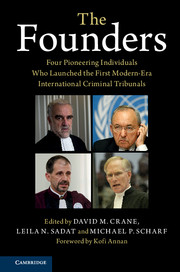 The Founders
The Founders 6 - The International Criminal Court
from PART II - THE FOUNDERS
Published online by Cambridge University Press: 23 March 2018
Summary
I had never imagined that I would be the chief prosecutor of the International Criminal Court (ICC). I had neither been involved in the discussions on the Rome Statute nor proposed my candidacy for the position. One morning in November 2002, I was parking my car in downtown Buenos Aires when my phone rang. It was a collaborator of Prince Zeid, Jordan's permanent representative to the United Nations. As the president of the Assembly of States Parties of the Rome Statute, Prince Zeid was leading the candidate search for the chief prosecutor of the International Criminal Court. My experience as prosecutor in Argentina's Junta Trial had placed my name at the top of a list of potential candidates. Prince Zeid wanted to meet me in New York to discuss whether I would be interested in the position.
At the time, I thought that my biggest professional achievement lay well behind me. I could never be involved in a bigger case than the Junta Trial. In 1985, I was deputy prosecutor in the case against three former dictators and six other members of the different military juntas that ruled Argentina between 1976 and 1982. They were charged for the crimes they ordered during the “Dirty War,” an Argentine version of the War on Terror.
I was very skeptical about my chances to be appointed, but I was not able to reject the possibility of being involved in Rome Statute implementation. I had witnessed the impact of the Argentina junta trial and I thought that a similar effect could be achieved at a global level. But in April 2003, 78 states parties of the Rome Statute granted me the privilege and the responsibility of being the first chief prosecutor of the ICC. My mission was to build the Office of the Prosecutor from scratch to make the Rome Statute's innovative legal design operational.
The context at the time was not the most favorable. The United States had just adopted a new policy to face international terrorism: the “War on Terror.” For decades “the US government had officially viewed terrorism as a law enforcement problem.” However, on the morning of 9/11 President Bush “decided that the conflict with Islamist terrorists must be viewed as a war.”
- Type
- Chapter
- Information
- The FoundersFour Pioneering Individuals Who Launched the First Modern-Era International Criminal Tribunals, pp. 94 - 125Publisher: Cambridge University PressPrint publication year: 2018


